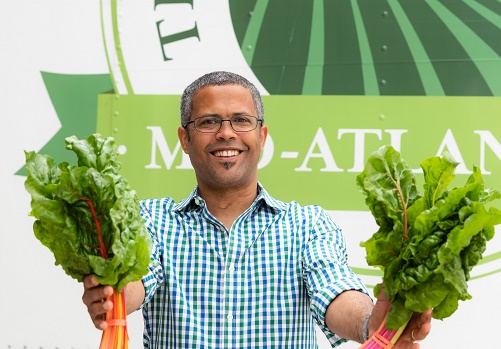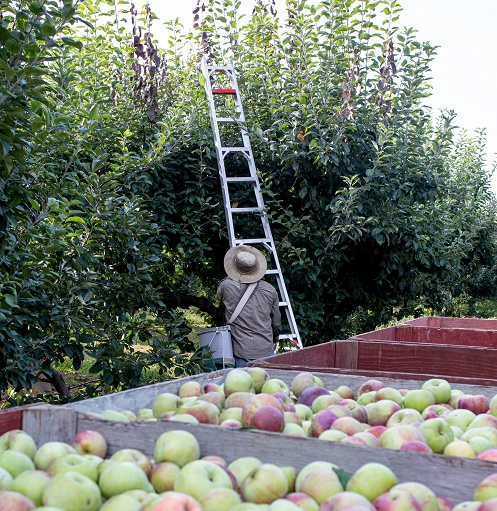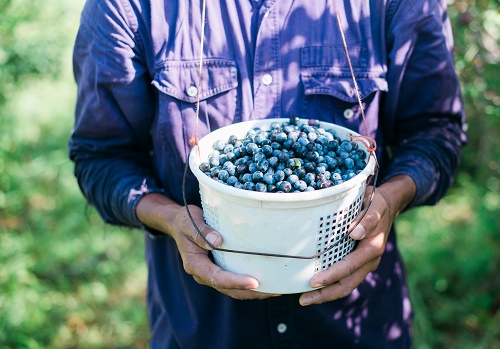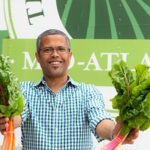The Common Market, based in Philadelphia and operating in the Mid-Atlantic, Southeast, and Texas, is a food distributor that plays a familiar role: stocking public and private institutions like schools, government agencies and grocery stores with fruits, vegetables, meat, and artisanal goods. But The Common Market’s approach is anything but typical, connecting urban communities with family farms and sourcing food from small and local producers. The Common Market (which co-author Haile Johnston co-founded) is democratizing food access and creating a thriving market for locally grown and produced foods, which too often are shut out of procurement processes.
Tools for transformational change
The Common Market does something else differently too: new farm partners are evaluated using a “farmer impact assessment tool,” which looks holistically at the impacts of a producer. Through this assessment, The Common Market tracks environmental factors such as biodiversity, soil health, pest management, and water and energy consumption. It also considers other factors, including the social conditions of workers and nutritional information of artisanal goods.
The Common Market has used the power of partnerships and procurement to drive $30 million to local and family farms since 2016, distributing more than 24 million pounds of food to almost 1,000 community organizations in 2020. The Common Market producers are 39 percent BIPOC and 46 percent women.
The idea of measuring a range of metrics and counting the “hidden” costs of food may be one of the most powerful tools we have to make transformational changes to our food systems. Today much of the world still uses old measures of progress, tracking food producers with metrics like yield per hectare, stock price, or market profits as sole indicators of value.
These economic valuation systems are a major driver of unsustainable food production and consumption. But as The Common Market shows, counting not only the financial profitability of these food producers but also their impacts on society, people and the environment tells a very different story.
“True Value” Assessment
Earlier this month, the Global Alliance for the Future of Food, published a sweeping “True Value” assessment of six food system initiatives around the world – The Common Market and five others. In this assessment by TMG, a sustainability think tank, each site was evaluated using a method called True Cost Accounting, an innovative tool that provides a holistic approach to assess, measure, and value all externalities — the positive and negative impacts — of food systems.
From Lagos, Zambia, the Philippines, Malawi, India, and the Americas; spanning farmer collaboratives, food banks, government agencies, researchers, and social enterprise, by assessing “true value” the report revealed significant benefits of each organization’s impacts on society, people, and the environment.
The assessments revealed the significant monetary and non-monetary benefits sustainable food systems have on issues like health, biodiversity conservation, climate, workers’ rights, community well-being, and gender empowerment. They also showed how TCA, as a holistic measurement tool, can be used for a variety of organizations — from businesses, farmer cooperatives, food banks, research facilities, and more.
It’s a new way of counting progress.
Frecon Farms, growing some of Pennsylvania’s finest tree fruits and berries since 1944, is distributed by The Common Market
Addressing food systems challenges
The Common Market stands along five other very different but uniquely inspiring food organizations addressing food systems challenges in creative and systemic ways.
In Zambia, COMACO, “Community Markets for Conservation,” is a social enterprise that supports the local community in the Luangwa Valley to adopt agroforestry, aiming to end wildlife poaching, deforestation, and food insecurity. There, the assessment showed over 3 million acres of forest preserved and a stunning 1700 former poachers turned into farmers.
Community Managed Natural Farming in India has implemented a method called Natural Farming – farming without the addition of synthetic fertilizer or pesticides – for over 700,000 farmers. The assessment showed reductions in pollution and emissions, better wages and earnings for farmers. The approach helped 86 percent of farmers move to better housing and cut emissions by 55 percent.
MASIPAG, the “Farmer–Scientist Partnership for Development,” is a decentralized farmer-led network of 50,000 small growers in the Philippines who farm ecologically for subsistence and local market sale. There, the assessment showed how small farmer networks create resilience across culture, agriculture, ecosystems, and the economy. Incomes rose over 50 percent and 74 different climate resistant varieties of rice have been developed.
In Nigeria, the Lagos Food Bank Initiative uses a food banking system to support meaningful community nutrition while also maintaining health and sustainability through urban farming, maternal health, and improved school outcomes. Here the assessment showed hundreds of women family farmers trained and over 333,000 pounds of food added to the local food supply.
In Malawi, the farmer-led Soils, Food and Healthy Communities has doubled crop diversity, tripled food security rates, dramatically increased revenue on essential crops like Maize. Crop diversity has doubled, and hundreds of farmer researchers have been trained – over half of them women.
Taken together, this recent report is an inspiring snapshot of food systems transformation around the world. It revealed extraordinary progress in areas from climate to COVID recovery, some of the most pressing challenges of our time. What this tells us is that it’s time to start measuring progress by the metrics that matter, on a local and a global scale. This can include monetary and non-monetary metrics, like impacts on climate and health.
Doing things differently
When COVID hit in March of 2020, The Common Market’s hundreds of farmers were all beginning to plant, just as their buyers were shutting down. The results could have been catastrophic. Instead, The Common Market began to identify and respond to emergency food assistance opportunities that emerged at the municipal and national level. With traditional supply chains facing disruptions and uncertainty, The Common Market found its stride in working directly with local family farms, aggregating products and distributing them as part of a new, free-of-charge Farm-Fresh Box initiative.
Byne Blueberry Farms, an organic blueberry farm in Waynesboro, Georgia, is distributed by The Common Market
Funding for the boxes came from a variety of new partnerships created with federal and local government agencies, in addition to a number of community-based distribution partners and a contract with the United States Department of Agriculture in the mid-Atlantic and southeast to distribute emergency food assistance. The Common Market’s activity increased tenfold, hiring more than 150 people from communities most affected by the virus to keep up.
Like the five other institutions assessed by the Global Alliance, The Common Market succeeded because it was doing things differently, and measuring progress in a different way. Their mission showed that addressing food insecurity requires looking beyond food production and distribution alone.
As we look for solutions to climate change, malnutrition, pandemics and even political instability, let these six “Beacons of Hope” be a guide. Food systems transformation has momentum and is gaining traction, in part by expanding the definition of what counts as progress and looking at success through a whole new lens.
Amanda Jekums is Program Coordinator for the Global Alliance of the Future of Food, and a contributing author of True Value: Revealing the Positive Impacts of Food Systems Transformation. Haile Johnston is the Co-Founder of The Common Market.






We love you #CommonMarket!!👩🏿🍳🖤👩🏿🌾
Congratulations on doing some great work, Haile!